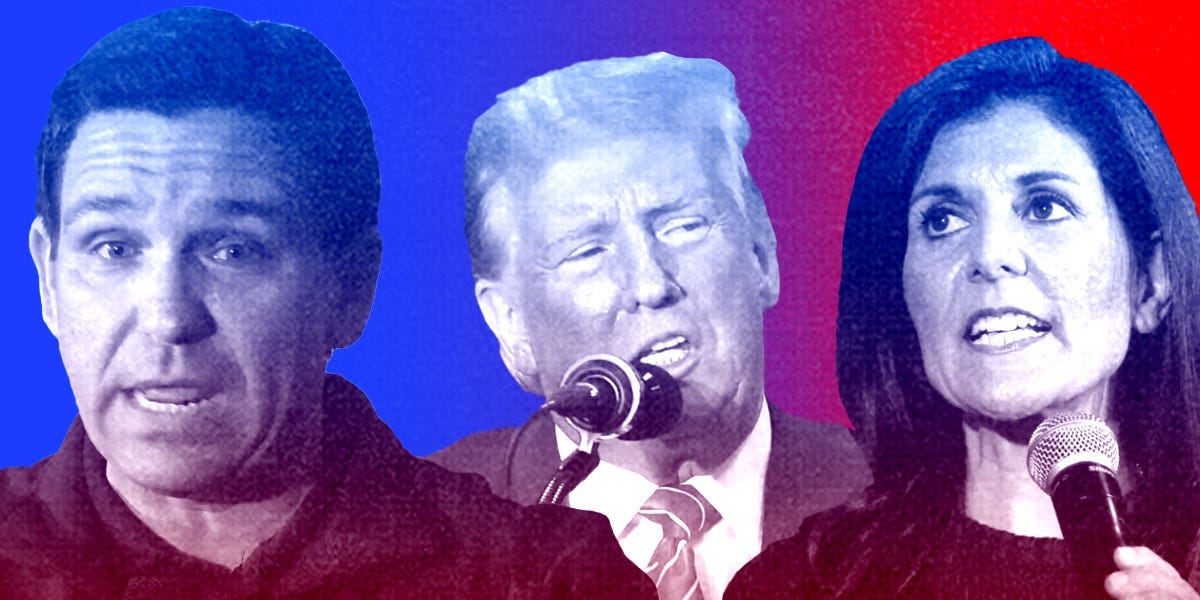
Scott Olson and Christian Monterrosa/AFP/Getty Images
- The 2024 Iowa Republican caucuses started on Monday evening.
- Iowans gathered at over 1,600 precincts to cast the first votes in the GOP primary.
- Former President Donald Trump was declared the winner almost immediately.
The 2024 presidential campaign officially started on Monday. As they have for decades, Iowa Republicans kicked off actual voting with a series of caucuses around the state's 99 counties.
There are few actual delegates at stake, but the prize of Iowa is the allure of claiming the first victory of the primary calendar. In some cases, pulling off a surprising finish is enough to stay alive for New Hampshire.
This year, the candidates will also be dealing with the added element of Mother Nature. Iowans are no strangers to winter storms, but the frigid temperatures have some worried about just how many in the state will turn out to caucus.
Here's what we're looking for ahead of the first major date on the 2024 political calendar.
Where does the race stand?
The race was called almost immediately for former President Donald Trump.
In the days ahead of the caucuses, polls showed former President Donald Trump running away with a double-digit lead. His quest to become the first former president to reclaim the White House since Grover Cleveland might well begin with history of its own: the largest margin of victory in a competitive Iowa Republican caucus.
As it stands, the late-Sen. Bob Dole holds the record with a 12-point in 1988 caucuses, though George H.W. Bush went on to easily win the presidency. The overall record will likely remain untouched considering then-Sen. Tom Harkin won the 1992 Iowa Democratic caucuses by over 70 points. Harkin, though, is an Iowa native.
As for the rest of the field, Iowa can provide surprising upsets. Recent caucuses, on both sides of the aisle, have been narrowly decided. Unlike most primaries, caucuses can be hard to poll, though if Trump were to somehow lose it would be a monumental upset.
The likely best-case scenario for former UN Ambassador Nikki Haley or Florida Gov. Ron DeSantis will be a strong second-place finish. Neither hopeful has done what is necessary to stand out. DeSantis has more to lose than Haley since he has essentially bet the farm on performing well in Iowa. Entrepreneur Vivek Ramaswamy has insisted he's still running for president but has lagged behind in both state and national polling.
What is a caucus?
In short, it's not a primary. If you're expecting a shouting fest where people can change their minds after they've voted, you're thinking of what was once the Democratic caucuses. The Democratic National Committee stripped Iowa Democrats of their first-in-the-nation status, so we won't get into that.
Iowa Republicans have a much simpler setup. It's essentially a straw poll where traditionally voters write the name of their preferred candidate on a slip of paper. There's no formal ballot, no voting machine, and no hole punching required. Just before voting, voters at each precinct say the pledge, and then someone, including potentially the presidential candidates themselves, can speak for each campaign. After the voting concludes, caucusgoers can stay for traditional party business like debating the merits of what should be on the party's platform.
Wait, so how is this different from a primary?
Unlike most primaries, the caucuses are entirely run by the Republican Party of Iowa. This means that there are no local or state election officials responsible for counting votes or certifying the results. In each precinct — there are over 1,600 throughout the state— a volunteer is responsible for ensuring things go smoothly and reporting the results to the state party. And yes, you could caucus in someone's living room, though that has mostly gone by the wayside. Most likely, Iowans will be in a school gym or a church or whatever place in their town has the most space.
The second biggest difference is that Iowa Republicans do not allow absentee voting. You show up on caucus night at your respective precinct or you don't get to vote. In comparison, New Hampshire Republicans, whose primary is the next major contest, allow for some absentee voting in their primary.
Why does Iowa matter?
My editor said I shouldn't quote Ricky Bobby because that movie came out in 2006, but it really does come down to being first. In this way, the caucuses are a media event. Journalists from around the world watch Iowa to see who wins. And yet, no candidate will have anywhere near the number of delegates needed to become the Republican presidential nominee.
What does history say about Iowa?
Traditionally, there are "three tickets" out of Iowa, meaning the top three or so finishers move on to the rest of the GOP primary calendar and the rest of the field drops out. In recent years, national parties have imposed polling and other thresholds for their major debates that have effectively winnowed the field before voting even begins. Some presidential hopefuls, most famously the late- Sen. John McCain, effectively skip Iowa, betting that the electorate in other states such as New Hampshire will be more favorable to their campaign.
As for the winners, the last three winners of a competitive Iowa Republican caucus, Sen. Ted Cruz of Texas, former Sen. Rick Santorum of Pennsylvania, and former Arkansas Gov. Mike Huckabee, all failed to win the GOP's presidential nomination. Critics and some candidates (Nikki Haley) use this to point out that the caucuses aren't predictive of who actually wins the overall race.
Iowans prefer to look at their status in the context of the three other early states. Effectively Iowa, New Hampshire, Nevada, and South Carolina are supposed to winnow the field. As smaller states, Iowa and New Hampshire are supposed to offer candidates with less money or name recognition the chance to compete.






